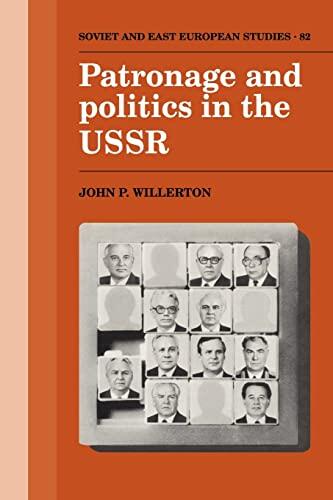
Patronage and Politics in the USSR
بواسطة
John P. Willerton
لا توجد تقييمات بعد
تنسيق
غلاف ورقي
صفحات
324
لغة
الإنجليزية
منشور
Oct 15, 2009
الناشر
Cambridge University Press
الطبعة
1
رقم ISBN-10
0521121337
رقم ISBN-13
9780521121330
الوصف
This scholarly work delves into the intricate web of patronage and political maneuvering within the Soviet Union. John P. Willerton, through meticulous research, offers a comprehensive analysis of how patron-client relationships influenced governance and policy decisions during a tumultuous era. The narrative unfolds the dynamics of power, showcasing the interplay between political elites and bureaucratic layers that helped shape the trajectory of Soviet politics.
Willerton places a strong emphasis on the significance of these intricate relationships, examining how loyalty and dependency played crucial roles in the functioning of the state. By investigating key historical episodes, he illuminates the mechanisms of political survival that many leaders employed to navigate the complexities of party politics and administrative control. This exploration is essential for understanding the broader implications of patronage in authoritarian regimes.
The book also critically engages with existing literature, contrasting traditional views of Soviet politics with fresh insights that reveal the depth of interpersonal connections amidst official structures. The discussions challenge conventional wisdom, encouraging readers to rethink the factors that contributed to both stability and instability within the USSR during its peak.
Ultimately, Willerton's examination serves not only as a historical account but also as a lens through which contemporary political dynamics in post-Soviet states can be understood. The work stands as a significant contribution to the field, enriching the conversation on the legacy of patronage and its ongoing relevance.
Willerton places a strong emphasis on the significance of these intricate relationships, examining how loyalty and dependency played crucial roles in the functioning of the state. By investigating key historical episodes, he illuminates the mechanisms of political survival that many leaders employed to navigate the complexities of party politics and administrative control. This exploration is essential for understanding the broader implications of patronage in authoritarian regimes.
The book also critically engages with existing literature, contrasting traditional views of Soviet politics with fresh insights that reveal the depth of interpersonal connections amidst official structures. The discussions challenge conventional wisdom, encouraging readers to rethink the factors that contributed to both stability and instability within the USSR during its peak.
Ultimately, Willerton's examination serves not only as a historical account but also as a lens through which contemporary political dynamics in post-Soviet states can be understood. The work stands as a significant contribution to the field, enriching the conversation on the legacy of patronage and its ongoing relevance.